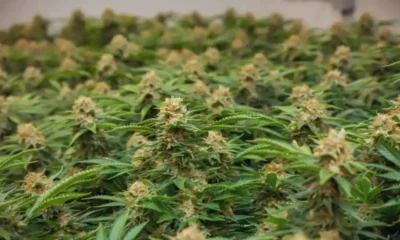Connect with us
Published
3 years agoon

Many of us may already live in places where cannabis is recreationally legal, but a new survey from Redfin, a Seattle-based real-estate brokerage, shows that a near-majority would prefer to live somewhere where cannabis is fully legal, compared to 22 percent of respondents who would rather live where prohibition is still in effect.
The survey looked at a sample of 1,023 people who moved to a new metro area since March 2020 and explored a number of social issues in addition to cannabis, namely in regard to voter protections, abortion rights and LGBTQ rights.
“People take the politics of a place into consideration when deciding where to move, but the truth of the matter is that other factors including housing affordability and access to jobs and schools take priority,” said Taylor Marr, Redfin deputy chief economist. “Oftentimes this means someone will move from a blue state to a red state (or vice versa), but choose a home in a neighborhood where most people hold the same political views as they do. Austin—a liberal Texas enclave that’s attracting scores of left-leaning folks from pricier coastal cities—is just one example.”
Regarding cannabis, the survey specifically asked respondents to rank their willingness to live in a place with “the following attributes: cannabis/marijuana is fully legal.” Respondents were given the options, “I would not live in a place like this; I prefer not to live in a place like this; I prefer to live in a place like this; I will only live in a place like this; I don’t care about this issue.”
To obtain the 22 percent figure for those who would rather not live in a place where cannabis is legal, the survey combined the 10 percent of respondents who would not live where cannabis is legal and the 12 percent who preferred not to. The same is true for the 46 percent figure; it combined the 34 percent of respondents who prefer to live in a place with legal cannabis and the 12 percent who said they would only live in a place with legal cannabis.
The answer with the second-highest responses was the option “I don’t care about this issue,” at 32 percent.
The survey falls in line with a study, published earlier this year by Clever Real Estate, which used data from Zillow and the census to examine how cannabis legalization has impacted home values. Researchers looked at three specific questions: how home values are impacted by recreational and medical cannabis legalization on a city level, how legalization impacts crime rates and how that crime impacts home values, and how retail dispensaries impact local home values.
Overall, they saw that cities allowing retail dispensaries had a home value increase of $22,888 more than cities where cannabis is illegal from 2014 to 2019. For cities with only legal medical cannabis, home values increased at a comparable rate to cities where cannabis is illegal, showing that home value increase was not related to explicitly medical cannabis legalization
The study also says that each new dispensary in a city increases the property values in that city by $519.
“When we controlled for other factors, we found that home values in areas that have legalized recreational marijuana leapt by $17,113 more than places where marijuana is illegal or only allowed for medicinal use. Even when we limited the comparison to recreational versus medicinal legalization, this disparity persisted. Places that legalize recreational marijuana saw home values increase by $15,129 more than those that only legalized medicinal use.”
The study notes Denver boasts the most significant growth: Since retail dispensaries first opened their doors on January 1, 2014, property values have increased by 67.8 percent. Researchers say this is a clear-cut example of dispensaries raising property values, and not just in Denver; their research shows cities across Colorado with dispensaries have higher than average property value growth compared to the national average.
Another study called “Retail Marijuana Deregulation and Housing Prices” by the University of Oklahoma also found that states legalizing cannabis see a boost in housing prices.
“This demonstrates that (it is) not simply the benefits of increased tax revenue, but also the existence of the dispensaries themselves, that is driving the price increases,” the researchers said. “The dispensaries act as commercial amenities that the public puts a premium on being nearby.”


Congressional Progressive Caucus Says Dems Can Legalize MJ By Winning House, Senate Majorities This November


Cannabis Industry Has 440,000 Full-Time Workers


Federal Register Proposes Adding Fentanyl, Removing MDMA From Drug Testing Panels


Feds File Charges Against Maine Weed Grower After Probe Spanning 20 States


The Cannabis Market Is Booming in Japan


German Authorities to Ban Cannabis Smoking, Vaping at Festivals Including Oktoberfest
